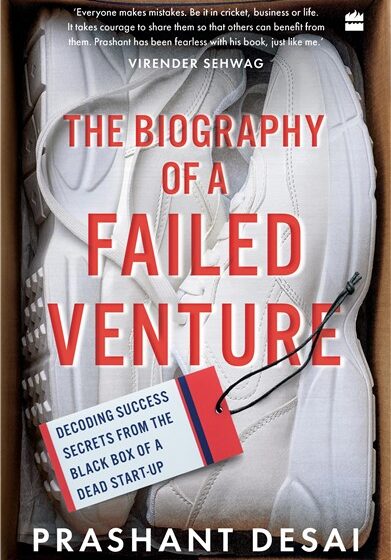Learning from mistakes, and excelling

The Biography of a Failed Venture is published by Harper Collins
Sukriti Tankha
The Biography of a Failed Venture is an account of learning from mistakes. It is the story of an Indian sports brand D:FY that Prashant Desai started in 2017, but couldn’t take it to success. In less than three years he lost everything he had earned in the three decades of his professional career. Not one to cry over the spilt milk, Desai decided to write a book on what all went wrong in his business so that it could act as a guide for future entrepreneurs. The book, published by Harper Collins, is winning rave reviews.
Born in Dhanbad (then Bihar), and brought up in Kolkata, Desai was seven when he lost his father to a heart ailment, and “we became very poor”. But it was this poverty that aroused a hunger to make money in him. “My mission in life ever since I was 15, was to get very rich,” he says. He didn’t know how to become rich, though. “But on my brother’s marriage, my mother took out a bunch of share certificates from the cupboard which my dad had invested in. When my brother tallied, we were aghast at the wealth it had become in 15 years. This introduced me to the magic of stock markets. I got my How,” he says.
Desai then decided to become a Cost and Chartered Accountant, and by 22 had joined a stock broker in the research department. Later, he started writing corporate annual reports for companies, including Reliance, Arcelor Mittal Steel NV, Lupin, Balrampur Chini etc. In 2003, he moved to Mumbai to work closely with Kishore Biyani and then moved on to work as Head of Research of Rakesh Jhunjhunwala. “Then I joined 63 moons Technolgies and went on to become its CEO & MD. In 2017, I started my entrepreneurial venture,” he says.
At present, he is working as a Senior Director, Everstone Capital being currently seconded to Burger King as Head of Strategy and Investor Relations. This apart, he also runs a financial literacy channel through his social media handles on LinkedIn, YouTube and Instagram (@itsprashantdesai).
The author tells us more, about the book and his life. Excerpts:

So, what prompted you to write about your failure?
When my business lost Rs 30 cr in 30 months, I was in denial. Disbelief too. Initially my EGO took me in a different direction. As if the whole world had conspired against my business and me. During the first lockdown, I reflected. Thought hard. When the mind had calmed, reality took precedence. I recognized that it was only my undoing that led to this failure. I started jotting my mistakes down. Not just the mistakes, but also why I made them. What was my mindset then? I wrote it with all the honesty. It took an emotional toll on me.
I then searched for entrepreneurs like me whose business failed, and their why. Unfortunately, despite my best, I could not find any. Further research brought to fore that as a society, we look down upon failures. It starts with school, where mistakes are punished. And when I saw my life and learnings, I realized that almost everything I learnt was from mistakes; mine and others. And yet, very few speak about them.
I decided to change this. And for this, I had to begin by sharing my mistakes. I started converting my notes into a narrative. I took the first draft to Harper Collins. And to my surprise they agreed to publish it.
With this book, my intent is two-fold. One, get mistakes its rightful seat at the table. Two, get more people to share their mistakes so others can benefit. Warren Buffett has said, “It is good to learn from your mistakes. It is better to learn from others.”
What have been your learnings from it?
So many that I wrote a book on it (laughs). One, running a business is like running a marathon, not a hundred metre race. Two, if you are in business, leave your ego home. Three, listen. Customers tell you a lot, data tells you a lot, but are you willing to listen? Four, there is a thin line between confidence and arrogance. I was arrogant. And yet I thought I was confident. Five, like the fable, the tortoise always wins in business too. In the end of the book I summarize all the mistakes.
How much time did it take you to write this book, cover to cover. Tell us what all went into it?
Six months. The process began with just writing down the mistakes and the emotion I felt when I made them. Then I went seven levels deep, and spent a lot of time behind the real ‘why’ I made them? Some of them took me to my childhood when I lost my dad at seven and we went into abject poverty. Some took me to my CA days and how I came all India fourth in CWA. It was like rewinding, pausing, reflecting, and then looking ahead. It was emotional.
Once the first script was ready, the book went through 10 rounds of edits from my side. How to make it more honest, more compelling. Every time, it was a huge emotional roller coaster. My filters were three: check every paragraph for 1. Is it boring? 2. Is it confusing? 3. Is it arrogant (complex)?
Losing 30 years of earnings is huge. Didn’t you ever feel depressed? How did you deal with it?
Yes, I was depressed. This was not just my earnings, this was my daughters’ too. I had no right to destroy that. I was also destroyed with the velocity of the fall. It was almost like falling off the cliff. In the book, I equate the loss to the loss of a child. Having to pull the child off the ventilator, despite not wanting to. It was tough. Depression, anger, resentment, I went through all the negative emotions. The circumstances were such that I had no choice but to move on. And I did. In 15 days I started work with Everstone Capital. The quality of work helped. And then when I accepted the failure, and wrote about it honestly, I felt calm. Every book starts with acknowledgements. Mine starts with apologies. When I said, and felt sorry for letting so many people, including myself down, I felt at peace. I could relate to what Gandhiji was saying when he wrote the letter to his father about the theft he had done, and apologizing later. I experienced that similar emotion. The power of a true apology from the heart.
Now that you know what your mistakes were, do you intend to start a similar or another venture? Or you want to establish yourself as an author?
I do not think I will be an entrepreneur. I write in the epilogue, that I may not be an entrepreneur but I will be entrepreneurial in everything I do. I discovered the joy of reading and writing while etching this biography. These days, I write for 60 minutes, every morning – on financial literacy and mistakes. I share them through my blogs and social media. I certainly don’t want to stop at one book.


